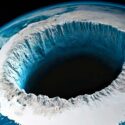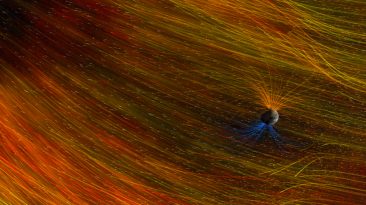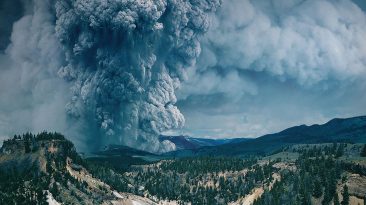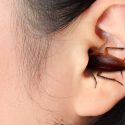This is not some harmless hair. It’s volcanic glass and it could turn your life into an itchy, blistering existence. Uh oh. Looks like today’s forecast is volcanic glass rain. How would glass get mixed up in the rain? What kind of damage would it do to your body? And how would you adapt if this became the new normal?
Volcanic glass particles are thin strands of glass fiber that form during volcanic eruptions. They are known as Pele’s hair, named after the Hawaiian goddess of fire and volcanoes. Volcanic glass particles are thin strands of glass fiber that form during volcanic eruptions. They are known as Pele’s hair, named after the Hawaiian goddess of fire and volcanoes.
They’re about 0.001 mm (0.00004 in) thick or just one micron. That’s about 100 times thinner than a single strand of your hair. They’re brittle and sharp, just like a piece of glass. So grab your toughest umbrella because you could get cut. You could be one of the 800 million people who live within 100 km (62 mi) of an active volcano.
Or not. Either way, you’d wake up from a restful night of sleep to discover a beautiful and mesmerizing light show outside your bedroom window. You’d see the Sun’s rays glistening as they reflect off clouds in the sky. And what appears to be a soft, golden-brown mat of animal hair all over the ground. But don’t run out barefoot just yet.
Pele’s hair can end up several kilometers from a volcanic eruption. But in this scenario, it would be everywhere. If you live in a place with frequent rainfall, like India, Denmark or Singapore, you should consider packing up your things. But where would you go? It would be raining volcanic glass all over the planet.
This spectacle would become a nuisance. Driving in a rainstorm would be even more difficult. You’d need to avoid using your windshield wipers. Or you’d end up with scratches all over your front window. And your car wouldn’t be the only concern. You should be careful about your health and safety too.
If Pele’s hair got into your skin, you’d end up with itchy, red rashes. And every piece would be so fragile it could break into even smaller pieces as you try to remove it. If this volcanic rain got into your eyes, they’d become red and irritated. You’d want to wear goggles or safety glasses whenever you go out in the rain.
The biggest nightmare of all would be the possibility the glass gets inside your body. The most obvious way would be from breathing it in. Short-term exposure could leave you coughing with itching in your lungs. And if the glass reached your lower lungs, it could make your existing respiratory issues like asthma worse.
The one silver lining is you likely wouldn’t get cancer from this hairy rain. But you’d want to invest in a comfortable mask with a good filter to avoid inhaling the glass anyway. Pele’s hair could end up in your drinking water. The strands are so fine they could bypass water filtration systems.
This could cause damage to your throat, stomach and intestines. It could block your digestive process, and you’d need emergency surgery. And you wouldn’t be the only living creature to suffer. As glass piles up around the world, plenty of animals would ingest it too. If you herd cattle, you’d want to pay close attention to what they are grazing on.
Or better yet, come up with a method to safely collect all this glass. Make sure to wear protection. Stock up on field gloves, thick-soled shoes and heavy-duty umbrellas. But with all this material outside for free, you could develop methods to reuse it. How about insulating material in buildings? This would be a great alternative to mineral wool used today.
Spinning molten rock materials creates mineral wool. But it’s difficult to recycle. So collecting glass as it falls from the sky would be a nice switch to a more sustainable resource. But life under the daily threat of Pele’s hair raining down from the sky would be more dangerous than pleasurable. Getting caught by a surprise shower would be like having a million sharp needles flying at you.
Sources
- “Pele’s Hair – Hawaiʻi Volcanoes National Park (U.S. National Park Service)”. 2022. nps.gov.
- “Do I Have Thick Hair? How To Find Your Hair Type And Density”. Lindsey Metrus. Katie McCarthy. 2021. byrdie.com.
- “How Big Is A Micron?”. 2022. bacteria-world.com.
- “Pele’s Hair And Pele’s Tears – Strange Lavas From Hawaii”. King, Hobart. 2022. geology.com.
- “Hawaii Volcano: How Many People Do Volcanoes Kill?”. Dr Sarah Brown. 2018. bbc.com.



























